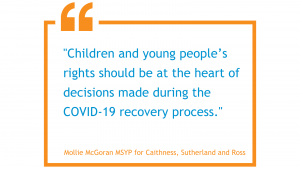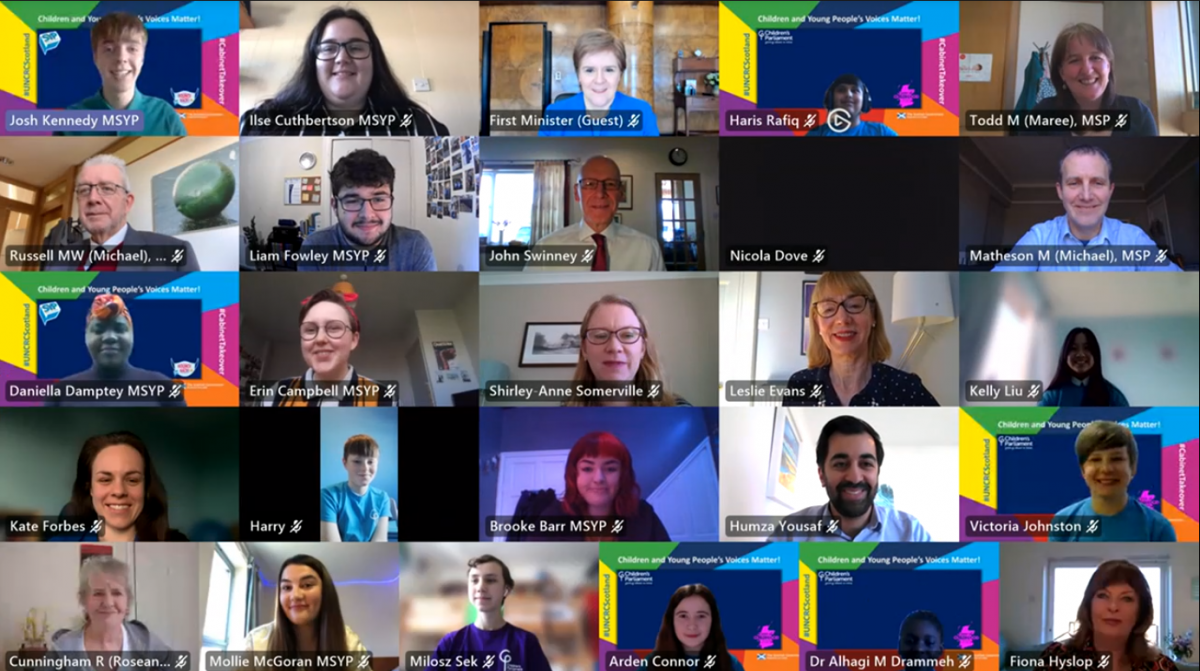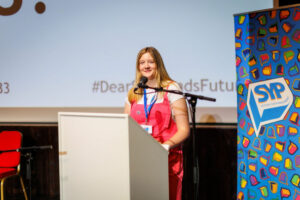Hi! My name is Mollie McGoran, MSYP for Caithness, Sutherland and Ross, and last month I had the pleasure of speaking at a Scottish Parliament Cabinet meeting in front of the FM, DFM and other cabinet ministers. This was an amazing opportunity for myself and my fellow MSYP’s to highlight issues to the parliament that we believe are the most prevalent to young people and what change we would like to see in relation to them.
We addressed a variety of important topics including anti-racism, championing the voices of seldom heard groups, education and employment. I talked about the impact of the pandemic on young people and the importance of a human rights based recovery, along with direct calls in relation to issues that have been exacerbated by COVID-19, such as mental health and digital exclusion, specifically in rural areas. At first, I was extremely nervous but overall I really enjoyed the experience to voice concerns that directly affect my constituents and also to hear the passionate contributions of the children’s parliament too.
But anyway here’s the speech!
“Children and young people’s rights should be at the heart of decisions made during the COVID-19 recovery process.

This statement underpins everything we are trying to accomplish here today. It is also at the centre of our Bounce Back campaign, which calls on the Scottish Government and local authorities to take a Human Rights Based approach to recovery from the pandemic. This campaign addresses five main areas of young people’s lives that have been particularly affected over the past year – mental health, education, youth work, jobs and economy, and poverty, all of which are underpinned by young people’s access to their rights.
I’d like to look at the immediate solutions young people would like to see in relation to some of these issues, specifically focusing on digital exclusion and the impact of the pandemic on young people’s mental health.
The past year has greatly increased the world’s reliance on technology, and as a result we need to acknowledge that the lack of universal access to strong and reliable broadband is exacerbating existing social inequalities. As a rural young person living in the highlands, I know first-hand the struggles that can come with living off the beaten track. The costly travel expenses, the lack of opportunities compared to those in urban areas, and the terrible, terrible wifi. Whilst the Scottish Government has taken steps to try to address this in rural areas, such as through R100 and covid-specific programmes, we believe more urgent action is required.
However, it is not just rural young people who have faced digital exclusion this year. Many young people living in areas of deprivation, and those who already experience social exclusion, have been further excluded by the lack of online access. A young person with experience of the criminal justice system told us ‘Without credit, you lose access to friends, family and support networks. I get 4GB of data to last a month. That’s one Zoom call and it’s gone. The impact is, I can’t access college, I can’t access all these different things.’
Young people have been excluded from education and access to youth work, from their friends, families, and support networks, and from society. We need to better equip Scotland’s young people through improved wifi connections, wider provision of technology for online formal and non-formal education, for extra-curricular activities, and to enable access to critical support.
In the past, SYP has described young people’s worsening mental health as our generation’s epidemic, and this has only been further exacerbated by both the digital exclusion and the pandemic more widely. This is something which impacts me personally and thousands of young people across the country.
We welcome the Scottish Government’s mental health transition and recovery plan and the new mental health forum. Your commitment to develop and deliver a new mental health training and learning resource to all school staff by summer 2021 is welcome and meets the call of young people.
However, we would like to see young people being actively involved in the design of this resource, and a greater focus on young people who are most at risk of developing mental health problems. Finally, young people have told us they would like everyone who works in education and health care to receive this kind of training. We hope this is something you consider extending so we can start to receive the support we need.
Today, I, as a young person and as a fierce advocate for the rights of young people in Scotland, implore you to hear our calls and act. “




